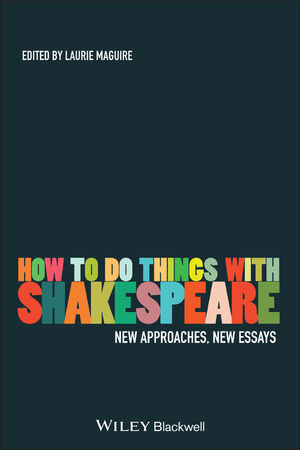How To Do Things With Shakespeare: New Approaches, New EssaysISBN: 978-1-4051-3527-6
Paperback
320 pages
October 2007, Wiley-Blackwell
 Other Available Formats: Hardcover
|
||||||
–Bruce Smith, University of Southern California, Los Angeles
"This collection of essays on How To Do Things with
Shakespeare, edited by Laurie Maguire, takes a wonderfully
fresh and unusual approach to its subject. The essays about
individual works center in some cases on texts too often neglected:
Cymbeline, Henry VIII, Love's Labour's Lost,
The Two Gentlemen of Verona,and The Winter's Tale,
along with the more familiar A Midsummer Night's Dream,
The Merchant of Venice, and the Sonnets. The topics are
equally arresting in their freshness of approach: how to do things
with sources, history, texts, animals, posterity. Animals! This is
Maguire's splendid approach to the question she has put to herself,
what the next stage in 'body' criticism might be. To provide an
answer, she calls on Erica Fudge to ask such questions as, Can
animals feel shame? Can they lose bladder control? as in the case
of Lance's fabulous dog in The Two Gentlemen. Paul Yachnin
addresses such puzzles by thinking about Renaissance ideas of sheep
and what they can tell us about personhood. The question, How to do
things with texts? is perhaps less off-beat, but it here produces
no less innovative answers from Tiffany Stern: not the usual
explanation of how quartos differ from folios and all that, but
instead pioneering textual analysis of how the language of books is
used to describe staging, and, conversely, how the language of the
stage can be used to describe reading. Anthony Dawson asks in what
way our thinking about the nature of texts has changed in recent
years and how that change affects the actual process of editing.
Source study is rescued from the low estate into which it has
fallen recently by three new and flexible ways of thinking about
influence. Similar pairings of approaches offer delight and
revelation about every topic in this engaging and highly readable
book. The studies are admirably cross-disciplinary and
cross-cultural. This is a companion to Shakespeare with a
difference. Vive la différance!"
–David Bevington, University of Chicago



